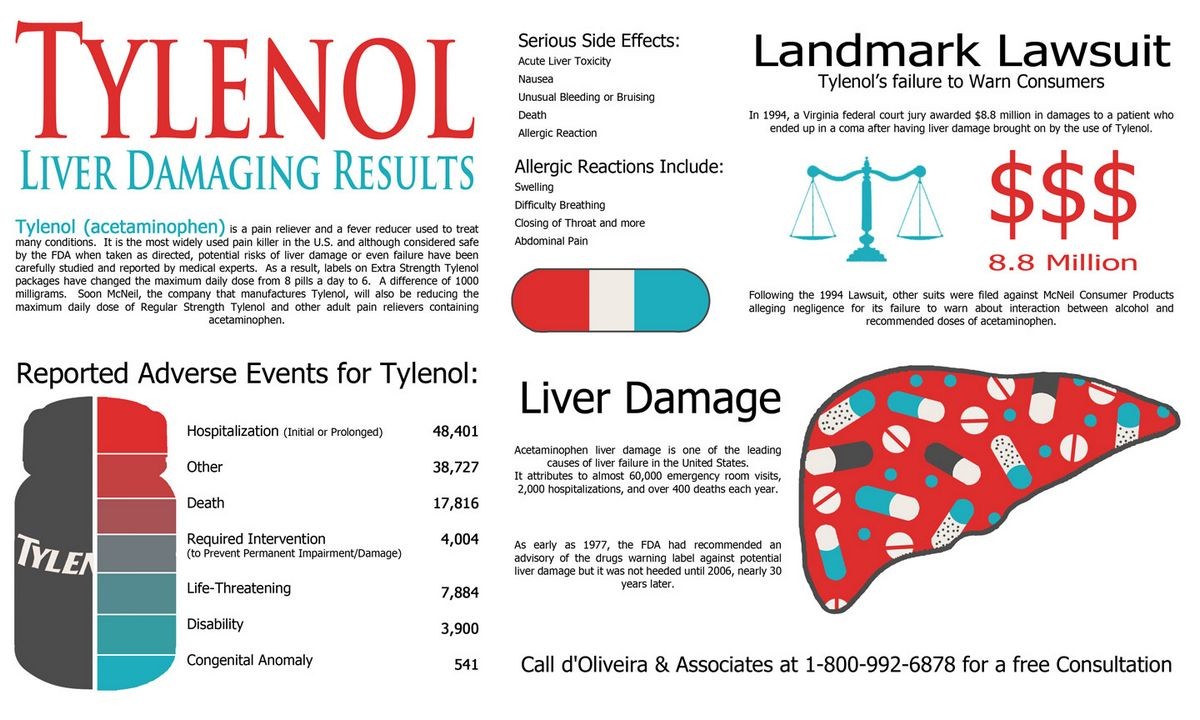
Contents
Tylenol (acetaminophen) Side Effects, Warnings, and Interactions
Tylenol (acetaminophen) is an analgesic and antipyretic to relieve fever, aches, and pains. It may be used for conditions such as mild arthritis, but it does not reduce inflammation, redness, or swelling of the joint. Tylenol is as effective as aspirin for pain relief when inflammation is not present. It is also comparable to ibuprofen in relieving pain caused by osteoarthritis of the knee. Side effects with appropriate use of Tylenol are rare.
The side effects of Tylenol may include rash, nausea, and headache.
Other important side effects of Tylenol include:
- hypersensitivity reactions
- serious skin reactions
- kidney damage
- anemia
- low platelets in the blood (thrombocytopenia)
Chronic alcohol use can increase the risk of stomach bleeding. The most serious side effect of Tylenol is liver damage due to large doses, chronic use, or concomitant use with alcohol or other drugs that also harm the liver. Additional serious side effects of Tylenol include:
- bleeding in the intestines and stomach
- angioedema
- Stevens-Johnson syndrome
- kidney damage
- reduced white blood cell counts
Tylenol is often used during pregnancy for short-term treatment of fever and minor pain. It is excreted in breast milk in small amounts, but it appears to be safe for use by nursing mothers.
What are the important side effects of Tylenol (acetaminophen)?
Side effects with appropriate use of acetaminophen are rare.
The most common side effects are rash, nausea, and headache.
Other important side effects include:
- Hypersensitivity reactions
- Serious skin reactions
- Kidney damage
- Anemia
- Reduced number of platelets in the blood (thrombocytopenia)
Chronic alcohol use can increase the risk of stomach bleeding. The most serious side effect is liver damage due to large doses, chronic use, or concomitant use with alcohol or other drugs that also harm the liver.
Other serious side effects that have been reported include bleeding in the intestines and stomach, angioedema, Stevens-Johnson syndrome, kidney damage, and reduced white blood cell counts.
Tylenol (acetaminophen) side effects list for healthcare professionals
The following serious adverse reactions are discussed elsewhere in the labeling:
- Hepatic Injury
- Serious Skin Reactions
- Allergy and Hypersensitivity
Clinical Trial Experience
Because clinical trials are conducted under varying conditions, adverse reaction rates observed cannot be directly compared to rates in other clinical trials and may not reflect the rates observed in practice.
Adult Population
A total of 1,020 adult patients have received acetaminophen in clinical trials. Most patients were treated with acetaminophen 1,000 mg every 6 hours. All adverse reactions that occurred in adult patients treated with acetaminophen or placebo in repeated dose, placebo-controlled clinical trials at an incidence = 3% and at a greater frequency than placebo are listed in Table 3. The most common adverse events in adult patients treated with acetaminophen (incidence = 5% and greater than placebo) were nausea, vomiting, headache, and insomnia.
| Gastrointestinal Disorders Nausea Vomiting | 138 (34) 62 (15) | 119 (31) 42 (11) |
| General Disorders and Administration Site Conditions Pyrexia* | 22 (5) | 52 (14) |
| Nervous System Disorders Headache | 39 (10) | 33 (9) |
| Psychiatric Disorders Insomnia | 30 (7) | 21 (5) |
Other Adverse Reactions Observed During Clinical Studies of Acetaminophen in Adults
The following additional treatment-emergent adverse reactions were reported by adult subjects treated with acetaminophen in all clinical trials (n=1,020) that occurred with an incidence of at least 1% and at a frequency greater than placebo (n=525).
Blood and lymphatic system disorders: anemia
General disorders and administration site conditions: fatigue, infusion site pain, edema peripheral
Investigations: aspartate aminotransferase increased, breath sounds abnormal
Metabolism and nutrition disorders: hypokalemia
Musculoskeletal and connective tissue disorders: muscle spasms, trismus
Psychiatric disorders: anxiety
Respiratory, thoracic and mediastinal disorders: dyspnea
Pediatric Population
A total of 355 pediatric patients have received acetaminophen in clinical trials. Pediatric patients received acetaminophen doses up to 15 mg/kg on a schedule of every 4 hours, every 6 hours, or every 8 hours. The most common adverse events (incidence = 5%) in pediatric patients treated with acetaminophen were nausea, vomiting, constipation, pruritus, agitation, and atelectasis.
Other Adverse Reactions Observed During Clinical Studies of Acetaminophen in Pediatrics
The following additional treatment-emergent adverse reactions were reported by pediatric subjects treated with acetaminophen (n=355) that occurred with an incidence of at least 1%.
Blood and lymphatic system disorders: anemia
Cardiac disorders: tachycardia
Gastrointestinal disorders: abdominal pain, diarrhea
General disorders and administration site conditions: injection site pain, edema peripheral, pyrexia
Investigations: hepatic enzyme increase
Metabolism and nutrition disorders: hypoalbuminemia, hypokalemia, hypomagnesemia, hypophosphatemia, hypervolemia
Musculoskeletal and connective tissue disorders: muscle spasm, pain in extremity
Nervous system disorders: headache
Psychiatric disorders: insomnia
Renal and urinary disorders: oliguria
Respiratory, thoracic and mediastinal disorders: pulmonary edema, hypoxia, pleural effusion, stridor, wheezing
Skin and subcutaneous tissue disorders: periorbital edema, rash
What drugs interact with Tylenol (Acetaminophen)?
Effects of Other Substances on Acetaminophen
Substances that induce or regulate hepatic cytochrome enzyme CYP2E1 may alter the metabolism of acetaminophen and increase its hepatotoxic potential. The clinical consequences of these effects have not been established. Effects of ethanol are complex, because excessive alcohol usage can induce hepatic cytochromes, but ethanol also acts as a competitive inhibitor of the metabolism of acetaminophen.
Anticoagulants
Chronic oral acetaminophen use at a dose of 4,000 mg/day has been shown to cause an increase in international normalized ratio (INR) in some patients who have been stabilized on sodium warfarin as an anticoagulant. As no studies have been performed evaluating the short-term use of acetaminophen in patients on oral anticoagulants, more frequent assessment of INR may be appropriate in such circumstances.
Summary
Tylenol (acetaminophen) is an analgesic and antipyretic to relieve fever, aches, and pains. It may be used for conditions such as mild arthritis, but it does not reduce inflammation, redness, or swelling of the joint. Side effects with appropriate use of Tylenol are rare.


